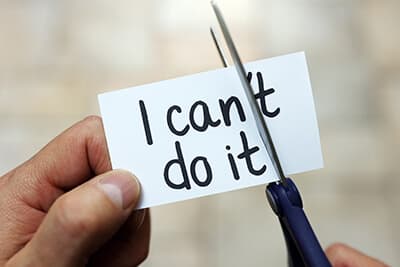How to Boost Your Self-Confidence in Recovery
Most people in recovery began struggling with their level of confidence long before they developed an addiction disorder. In fact, for many, drinking or drug use was a coping mechanism for low self-confidence, a way to feel more comfortable and capable in life. When they stop drinking and getting high, however, low self-confidence returns, and it can become a trigger for relapse.
Tips for Increasing Self-Esteem in Recovery
If you are in recovery and your lack of confidence is intruding on your ability to make progress, you can begin making changes right now that can change your life. Here’s what you need to know:

- Your viewpoint and perspective can deeply impact your self-esteem. Your ability to project self-confidence in your life and to the people around you starts with your mind. There are a number of things you can do to start shifting your perspective toward one that is self-supporting and positive.
- Your behaviors matter, too. The things you do when you are alone, the things you do when you are around others, and how you choose to move forward toward your goals all impact your level of confidence as well. You can make choices every day all day that build you up and improve your self-esteem.
- Even as you are building your self-confidence, you will not feel confident at all times. Ebb and flow is normal, especially in early recovery, and how you feel about everything and everyone – including yourself – is bound to change from day to day. Don’t let it cause you to feel as if there is no hope.
- Compassion is essential. It is going to take time to build your self-confidence to the point that you genuinely feel like you are powerful in your own life most of the time. Everyone has moments of self-doubt and fears about taking on certain challenges. In order to get through those times without feeling as if you are taking on the impossible by trying to develop your self-esteem, you have to be compassionate with yourself.
- Positive self-talk can help you to refocus and put things in perspective. That running dialogue with yourself that is constant in your mind can help you or it can hurt you. If you naturally tend to downplay your abilities, cut yourself down (e.g., “You’re so stupid, you’ll never be able to do anything right.”), or badmouth yourself to yourself, then you are giving yourself more negativity to overcome. Instead, it is important to make the conscious choice to engage in positive self-talk, even if it feels forced at first.
- There is no such thing as failure. Though you may not have achieved the objective you set out to achieve in the beginning, you learned from the experience. You may have learned what to do differently next time, or that you don’t really need what it is you were trying to gain. You may have picked up a couple friends or a better understanding of yourself and your limitations along the way. This is all good information that will serve you in the future; thus, it is a learning opportunity, not a failure.
- Everyone has an expertise in something – including you. If you didn’t go to college, don’t have a solid footing in your career, or feel like you don’t have a good grasp of some of the basics for living and functioning in the “straight” world, you may feel like you aren’t good at much of anything. But the truth is that there is some unique skillset that you hold that is valuable. It is just a matter of finding and owning it.
- You have a purpose for being here. You, like everyone, have a reason for being on this earth. There is a purpose for your life and likely more than one. Your goal in recovery, in addition to staying sober, is to figure out what your purpose is in this moment and to actively pursue it. Your self-confidence will grow along with the progress you make toward living an authentically meaningful life.
What is your purpose in recovery? How are you working to build your self-confidence and feel strong as you build a life for yourself in sobriety? Are you actively working to improve your self-perception and your self-esteem while staying substance-free?